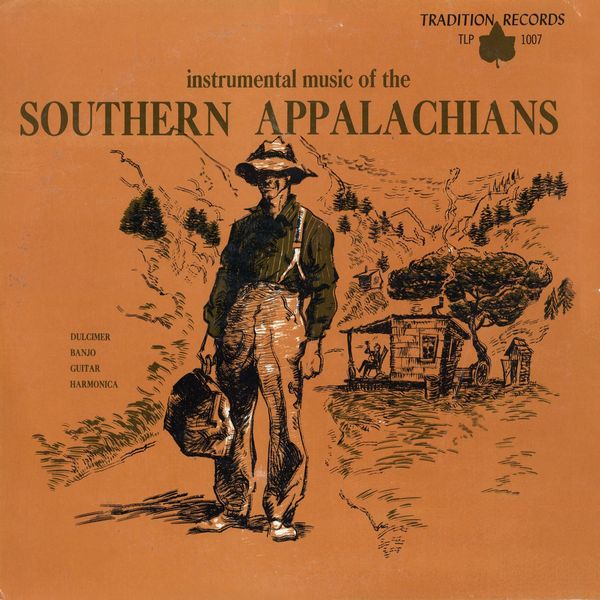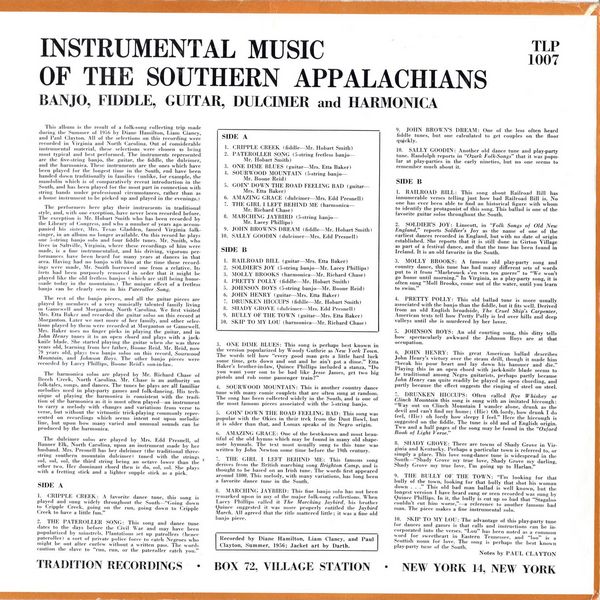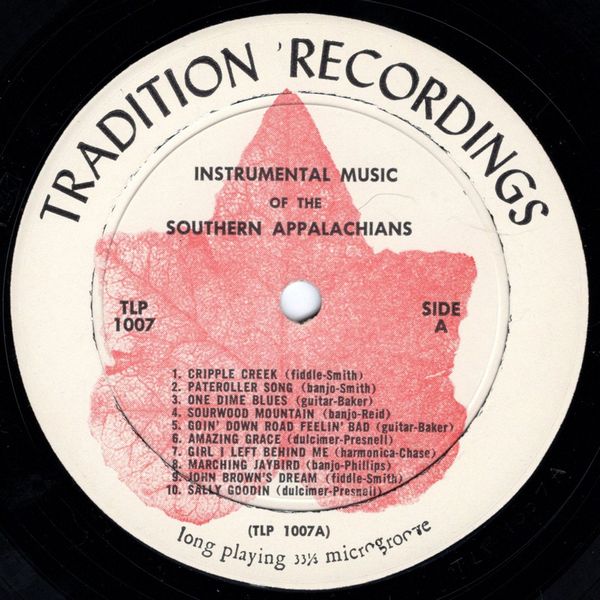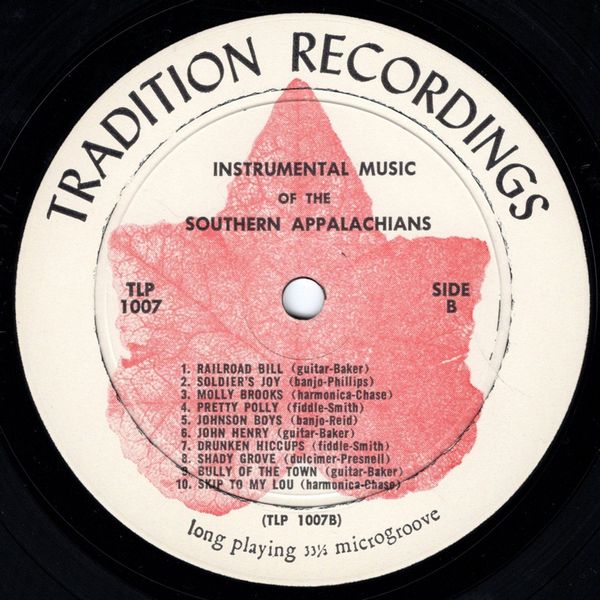

 |



|
Sleeve Notes
This album is the result of a folk-song collecting trip made during the Summer of 1956 by Diane Hamilton, Liam Clancy, and Paul Clayton. All of the selections on this recording were recorded in Virginia and North Carolina. Out of considerable instrumental material, these selections were chosen as being most typical and best performed. The instruments represented are the five-string banjo, the guitar, the fiddle, the dulcimer, and the harmonica. These instruments are the ones which have been played for the longest time in the South, end have been handed down traditionally in families (unlike, for example, the mandolin which is of comparatively recent introduction in the South, and has been played for the most part in connection with string bands under professional circumstances, rather than as a home instrument to be picked up and played in the evenings.)
The performers here play their instruments in traditional style, and, with one exception, have never been recorded before. The exception is Mr. Hobart Smith who has been recorded by the Library of Congress, and who a number of years ago accompanied his sister, Mrs. Texas Gladden, famed Virginia folk-singer, in an album no longer available. On this record he plays one 5-string banjo solo and four fiddle tunes. Mr. Smith, who lives in Saltville, Virginia, where these recordings of him were made, is a fine instrumentalist, and his driving, vigorous performances have been heard for many years at dances in that area. Having had no banjo with him at the time these recordings were made, Mr. Smith borrowed one from a relative. Its frets had been purposely removed in order that it might be played like the old fretless banjos (which are still being homemade today in the mountains.) The unique effect of a fretless banjo can be clearly seen in his Pateroller Song.
The rest of the banjo pieces, and all the guitar pieces are played by members of a very musically talented family living in Gamewell and Morganton, North Carolina. We first visited Mrs. Etta Baker and recorded the guitar solos on this record at Morganton. Later we met more of her family, and other selections played by them were recorded at Morganton or Gamewell. Mrs. Baker uses no finger picks in playing the guitar, and in John Henry tunes it to an open chord and plays with a jack-knife blade. She started playing the guitar when she was three years old, learning from her father, Boone Reid. Mr. Reid, now 79 years old, plays two banjo solos on this record, Sourwood Mountain, and Johnson Boys. The other banjo pieces were recorded by Lacey Phillips, Boone Reid's son-in-law.
The harmonica solos are played by Mr. Richard Chase of Beech Creek, North Carolina, Mr. Chase is an authority on folk-tales, songs, and dances. The tunes he plays are all familiar melodies used in play-party games and folk-dancing. His technique of playing the harmonica is consistent with the tradition of the harmonica as it is most often played — an instrument to carry a melody with changes and variations from verse to verse, but without the virtuostic trick-playing commonly represented on recordings which seems intent not upon melodic line, but upon how many varied and unusual sounds can be produced by the harmonica.
The dulcimer solos are played by Mrs. Edd Presnell, of Banner Elk, North Carolina, upon an instrument made by her husband. Mrs. Presnell has her dulcimer (the traditional three-string southern mountain dulcimer) tuned with the strings sol, sol, sol, the third string being an octave lower than the other two. Her dominant chord then is do, sol, sol. She plays with a fretting stick and a lighter supple stick as a pick.
CRIPPLE CREEK: A favorite dance tune, this song is played and sung widely throughout the South — "Going down to Cripple Creek, going on the run, going down to Cripple Creek to have a little fun."
THE PATEROLLER SONG: This song and dance tune dates to the days before the Civil War and may have been popularized by minstrels. Plantations set up patrollers (hence pateroller) a sort of private police force to catch Negroes who might be out after curfew without a written pass. The words caution the slave to "run. run. or the pateroller catch you."
ONE DIME BLUES: This song is perhaps best known in the version popularized by Woody Guthrie as New York Town. The words tell how "every good man gets a little hard luck some time, gets down and out and he ain't got a dime." Etta Baker's brother-in-law, Quince Phillips included a stanza. "Do you want your son to be bad like Jesse James, get two big pistols and rob some passenger train?"
SOURWOOD MOUNTAIN: This is another country dance tune with many comic couplets that are often sung at random. The song has been collected widely in the South, and is one of the most famous pieces associated with the 5-string banjo.
GOIN' DOWN THE ROAD FEELING BAD: This song was popular with the Okies in their trek from the Dust Bowl, but it is older than that, and Lomax speaks of its Negro origin.
AMAZING GRACE: One of the best-known and most beautiful of the old hymns which may be found in many old shape-note hymnals. The text most usually sung to this tune was written by John Newton some time before the 19th century.
THE GIRL I LEFT BEHIND ME: This famous song derives from the British marching song Brighton Camp, and is thought to be based on an Irish tune. The words first appeared around 1800. This melody, with many variations, has long been a favorite dance tune in the South.
MARCHING JAYBIRD: This fine banjo solo has not been remarked upon in any of the major folk-song collections. When Lacey Phillips called it The Marching Jaybird, his brother Quince suggested it was more properly entitled the Jaybird March. All agreed that the title mattered little: it was a fine old banjo piece.
JOHN BROWN'S DREAM: One of the less often heard fiddle tunes, but one calculated to get couples on the floor quickly.
SALLY GOODIN: Another old dance tune and play-party tune. Randolph reports in "Ozark Folk-Songs" that it was popular at play-parties in the early nineties, but no one seems to remember much about it.
RAILROAD BILL: This song about Railroad Bill has innumerable verses telling just how bad Railroad Bill is. No one has ever been able to find an historical figure with whom to identify the protagonist of this song. This ballad is one of the favorite guitar solos throughout the South.
SOLDIER'S JOY: Linscott, in "Folk Songs of Old New England," reports Soldier's Joy as the name of one of the earliest dances recorded in England, but with no date of origin established. She reports that it is still done in Girton Village as part of a festival dance, and that the tune has been found in Ireland. It is an old favorite in the South.
MOLLY BROOKS: A famous old play-party song and country dance, this tune has had many different sets of words put to it from "Marbrouck s'en ven ten guerre" to "We won't go home until morning." In Virginia, as a play-party song, it is often sung "Moll Brooks, come out of the water, until you learn to swim."
PRETTY POLLY: This old ballad tune is more usually associated with the banjo than the fiddle, but it fits well. Derived from an old English broadside, The Cruel Ship's Carpenter, American texts tell how Pretty Polly is led over hills and deep valleys until she is murdered by her lover.
JOHNSON BOYS: An old courting song, this ditty tells how spectacularly awkward the Johnson Boys are at that occupation.
JOHN HENRY: This great American ballad describes John Henry's victory over the steam drill, though it made him "break his poor heart and lay down his hammer and die." Playing this in an open chord with jack-knife blade seems to be traditional among Negro guitarists, perhaps partly because John Henry can quite readily be played in open chording, and partly because the effect suggests the ringing of steel on steel.
DRUNKEN HICCUPS: Often called Rye Whiskey or Clinch Mountain this song is sung with an imitated hiccough: "Way out on Clinch Mountain I wander alone, drunk as the devil and can't find my home; (Hie) Oh lordy, how drunk I do feel, (Hie) oh lordy how sleepy I feel." Here the hiccough is suggested on the fiddle. The tune is old and of English origin. Two and a half pages of the song may be found in the "Oxford Book of Light Verse."
SHADY GROVE: There are towns of Shady Grove in Virginia and Kentucky. Perhaps a particular town is referred to, or simply a place. This love song-dance tune is widespread in the South — "Shady Grove my true love, Shady Grove my darling, Shady Grove my true love, I'm going up to Harlan."
THE BULLY OF THE TOWN: "I'm looking for that bully of the town, looking for that bully that shot his woman down . . ." This old bad man ballad is well known, but the longest version I have heard sung or seen recorded was sung by Quince Phillips. In it, the bully is cut up so bad that "Stagaloo couldn't cut him worse," — a reference to another famous bad man. The piece makes a fine instrumental solo.
SKIP TO MY LOU: The advantage of this play-party tune for dances and games is that calls and instructions can be in corporated into the verses. "Lou" has been noted as a common word for sweetheart in Eastern Tennessee, and "loo" is a Scottish noun for love. The song is perhaps the best known play-party tune of the South.
Notes by PAUL CLAYTON